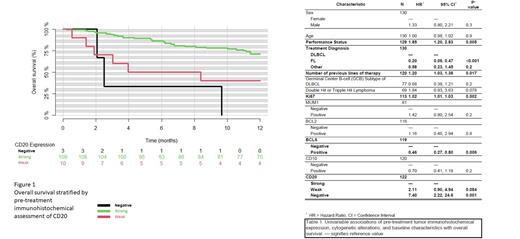Introduction
Several studies show that CD3xCD20 bispecific antibodies show promising results in relapsed or refractory B-cell lymphomas and may have a milder adverse effect profile compared to chimeric antigen receptor T cell therapy (CAR-T). Tumor loss of antibody target (i.e. CD19 or PD1) have shown to negatively affect treatment outcomes in CD19-CAR-T cell therapy in DLBCL, and anti-PD1 therapy in Hodgkin lymphoma. It has, to our knowledge, not been reported how loss of CD20 expression and other immunohistochemical (IHC) expression patterns affects treatment outcomes in patients treated with CD3xCD20 antibodies.
Methods
We collected data on all patients in Denmark who received CD3xCD20 bispecific antibodies from 2017 to 2023. Electronic health records were assessed for general baseline characteristics and response according to Lugano criteria. Pathology reports on pre- and post-CD3xCD20 therapy lymphoma samples were collected and assessed on IHC analysis of CD20, Ki67, CD10, Bcl2, Bcl6, MUM1, germinal center B-cell (GCB) subtype and non-germinal center B-cell subtypes (non-GCB) according to Hans algorithm, as well as reports on cytogenetic FISH analysis regarding MYC with BCL2 and/or BCL6 rearrangements. To determine whether an expression was weak, negative, or strong the assessment of the original pathology reports was used.
Results
Pre-treatment IHC assessments were available in 122 patients. These were distributed across 81 patients with DLBCL, 32 with FL and 9 with other lymphoid neoplasms (MZL, HL, CLL). Of these, 109 had a strong CD20 expression, 10 had a weak CD20 expression, while 3 had no expression of CD20. Patients with a weak CD20 expression before treatment had an overall survival (OS) rate after 12 months at 40% (95% CI, 9.5-70) compared to 69% in patients with strong CD20 expression (95% CI, 45-61) (Figure 1, p=0.08). In a univariable Cox regression, we found that negative CD20 expression and higher Ki67 was significantly associated with inferior OS (Table 1, respectively HR=2.11 and HR=1.02 (per %-change in Ki67)). Worse performance status and a higher number of previous lines of treatment were also significantly associated with inferior overall survival (respectively HR=1.85 and HR=1.20). Surprisingly, BCL6 rearrangement was significantly associated with superior OS (HR=0.46).
In a multivariable cox regression using OS as the endpoint, weak and negative IHC expression of CD20 was significantly associated with inferior OS (respectively HR=3.29, 95% CI 1.32-8.23, p=0.011 and HR=6.79 95% CI 1.25-36.76, p=0.026). Positive BCL6 compared to negative was associated with increased OS (HR =0.48, 95% CI 0.24 - 0.94, p=0.032). Analyzing only patients with DLBCL (n=81), weak and negative IHC expression of CD20 were the only factors to remain significantly associated with inferior overall survival (respectively HR=3.01, 95% CI 1.10-8.28, p=0.032 and HR=7.26, 95% CI 1.35-43.35, p=0.026). BCL6 rearrangement was associated with an increased overall survival, however only borderline statistically significant (HR=0.53, 95% CI 0.26-1.08, p=0.082).
With regards to treatment response weak CD20 expression, worse performance status, higher Ki67 and a higher number of prior lines of treatment was in univariable analysis significantly associated with not being in a complete remission (CR) (respectively HR=2.28, HR=1.73, HR=1.01(per %-change in Ki67), HR=1.23 (per prior line of treatment). In a multivariable cox regression only weak and negative CD20 expression remained significantly associated with not being in CR (respectively HR=2.40, 95% CI 1.1-5.25, p=0.028 and HR=5.7 95% CI 1.14-28.58, p=0.034).
Of the 48 patients who had biopsy-confirmed relapse, 29 had a weak or negative IHC CD20 expression (24 with a negative expression and 5 with a weak expression). Of these 29 patients, 24 had a strong pre-treatment IHC CD20 expression.
Conclusions
To our knowledge, we here present the first long-term analysis of the prognostic effect of tumor immunohistochemistry properties in patients treated with CD3xCD20 bispecific antibodies. We find that CD20 expression before treatment is an important prognostic factor, as patients with lymphomas with weak CD20 expression yield significantly poorer responses and decreased overall survival. Additionally, we find that BCL6 rearrangement is associated with superior overall survival in patients treated with CD3XCD20 bispecific antibodies.
Disclosures
Clausen:AbbVie, Janssen, Gilead, Astra Sencea, Genmab, Roche, Incyte:: Consultancy. Niemann:Carsten Niemann has received research funding and/or consultancy fees from AstraZeneca, Janssen, AbbVie, Beigene, Genmab, CSL Behring, Octapharma, Takeda, and Novo Nordisk Foundation.: Consultancy, Research Funding. Grønbæk:Kirsten Grønbæk received research support from Janssen and is on the advisory board of Nanexa and GSK.: Consultancy, Research Funding. Hutchings:Martin Hutchings has a Consulting or Advisory Role at Takeda, Roche and Genmab and has received Research Funding from Celgene, Genmab, Roche, Takeda and Novartis.: Consultancy; AbbVie, AstraZeneca, Celgene, Genmab, Janssen, Merck, F. Hoffmann-La Roche Ltd, Takeda: Consultancy; AbbVie, AstraZeneca, Bristol Myers-Squibb, Celgene, Genentech, Genmab, Incyte, Janssen, Merck, Novartis, F. Hoffmann-La Roche Ltd, Takeda: Research Funding; AbbVie, AstraZeneca, Celgene, Genmab, Janssen, Merck, F. Hoffmann-La Roche Ltd, Takeda: Honoraria; AbbVie, AstraZeneca, Celgene, Genmab, Janssen, Merck, F. Hoffmann-La Roche Ltd, Takeda: Membership on an entity's Board of Directors or advisory committees.


